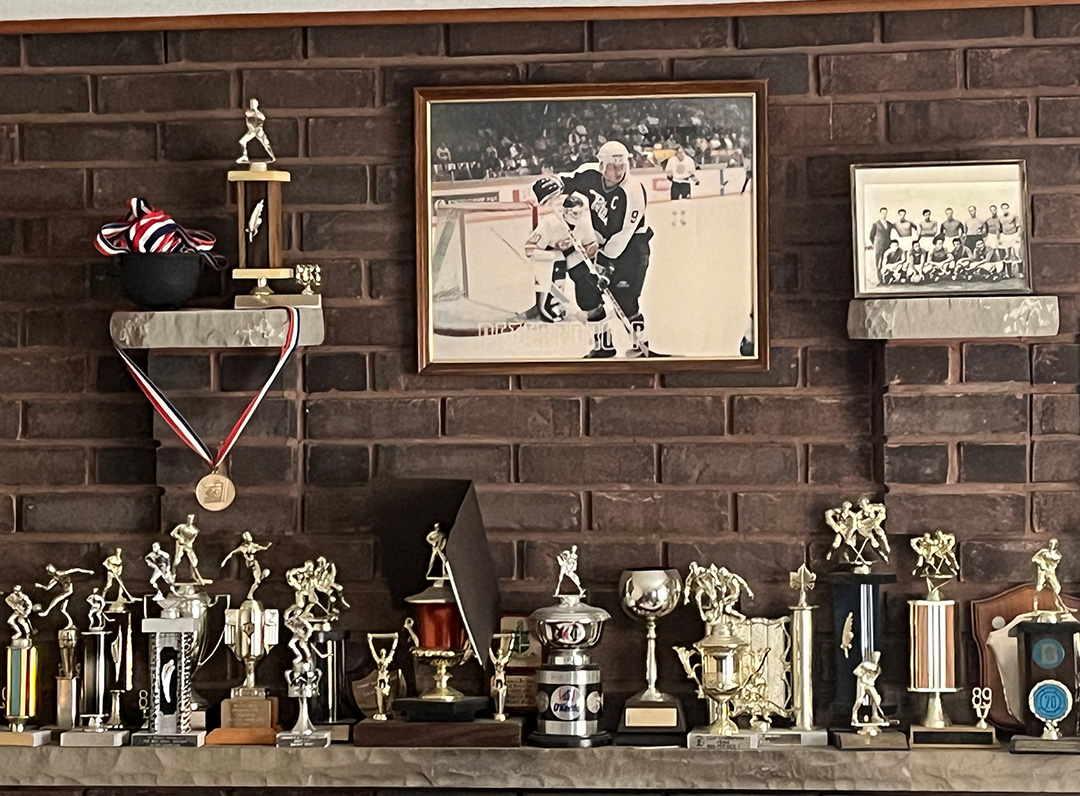Scarborough native Mike Ricci built a reputation as a hardworking player who is willing to do what it takes to help his team win. Known for his long hair and toothless smile, Ricci was a fan favourite wherever he played.
Born to Italian immigrant parents, Mario and Anna, he started attracting attention as a prospect while playing for the Toronto Marlboros of the Metro Toronto Hockey League.
At 15 years old, he was selected by the Peterborough Petes of the Ontario Hockey League (OHL) and impressed coaches immediately. In Peterborough, Ricci’s role was clear. Scoring was his job.
“My coach Dick Todd was never afraid of telling me, ‘If you don’t score great goals we’re not going to win,'” Ricci recalled.
Ricci was an elite scorer during his junior career and set numerous records while leading Peterborough to an OHL championship and Memorial Cup berth.
While at the Memorial Cup, Ricci caught chickenpox severely hindering his effectiveness on the ice and the team disappointingly finished third in the tournament.
“It might have been the only time in my career I almost told the coach, I don’t know if I could play the game. I know that game I had nothing left but I didn’t tap out,” he said.
In addition to playing in the OHL, Ricci twice represented Canada at the World Junior Championships and won gold as the team captain before setting his sights on the National Hockey League (NHL).

Heading into the 1990 NHL draft, Ricci was ranked No. 1 in scouting and ended up being selected by the Philadelphia Flyers with fourth overall pick. The stakes were much greater in the NHL and every aspect of the game was now going to be a battle. In Philadelphia, Ricci learned from his veteran teammates about how to compete against the world’s elite players.
“Every faceoff was important; you know you’re going against guys that if they don’t win that faceoff they might not have a job,” he said.
After two years in Philadelphia, Ricci was sent to Quebec City, along with Peter Forsberg and Ron Hextall, in a trade for Eric Lindros.
Joining the Nordiques for the 1993 season, Quebec possessed a loaded roster and the passionate fan base and media had high expectations for the team.
“You know, when you lose to Montreal you could feel how depressed the whole town was,” Ricci recalled. You’d go to the same coffee shop, and they didn’t speak English the day after you lose to Montréal. You beat Montréal and they have your order waiting for you on the counter.”
While Ricci quickly became an integral part of the Nordiques, his time in Quebec was short-lived. Financial issues led to the Nordiques being relocated to Colorado for the 1996 season, where they were renamed the Avalanche.
Though hockey was not as meaningful there, the team quickly grabbed the spotlight due to their rapid success. Still, the popularity of the team was not on par with playing in Quebec.
He recalled a story where not even star Joe Sakic could get a table at the Cheesecake Factory in Denver. “We used to walk into the nicest restaurants in Quebec City and they’d move people and make a table for us, so it was a culture shock,” he said.
Heading into the 1996 season the Avalanche’s goal was to win a championship. Ricci was hindered by injuries that season and underwent four surgeries. He rarely practised as the team wanted to ensure he would be ready for the post-season.
During the playoffs, Ricci felt he owed his teammates a great performance and followed through, anchoring the team’s penalty kill and scoring 17 points over 22 gruelling games on the way to a Stanley Cup victory.
A year later, Ricci was traded to the San Jose Sharks in exchange for a first-round pick. Fans took an immediate liking to Ricci and the team began to improve. The Sharks became a force in the Western Conference but fell short of winning it all.
In the Bay Area, Ricci established himself as one of hockey’s best defensive forwards earning a Selke Trophy nomination, an award granted to the forward who demonstrates the most skill on the defensive end.
Ricci would finish his career with Phoenix Coyotes, who he signed with just before the 2005 NHL lockout.
The Coyotes struggled to find success his first year and, in the off-season, Ricci was injured and underwent major surgery to repair a disk in his neck. It took nine weeks before he regained the use of his right arm, and the injury held him to just six games in his final year. Despite his desire to play, team doctors were reluctant to allow him back on the ice.
Ricci became a free agent in 2007 and drew some interest from teams but felt he would no longer be able to pass a physical due to his injuries. He then made the difficult decision to retire.
After 16 years in the NHL, Ricci finished his playing career with over one thousand games played, a world junior gold medal, a world championship, and a Stanley Cup victory.
The San Jose Sharks reached out with a coaching position shortly after his retirement and he began mentoring younger players. Ricci now does a bit of everything as the Sharks development coach specializing in faceoffs.
As a coach, Ricci stresses to young players that success involves more than just skills. It also requires being a good teammate and focusing on the small details that are necessary for winning games.
“If you want to be on a winning team, it has to be about ‘we’ not just about ‘me,’” he said.




